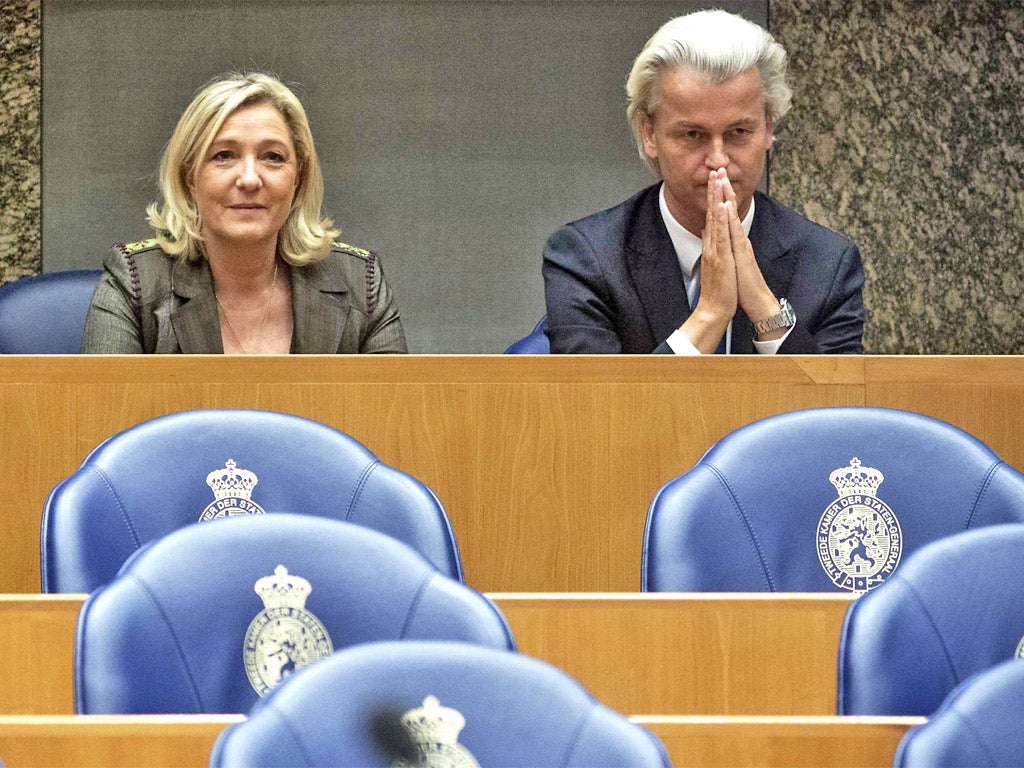Right-wing leaders aim for alliance of ‘like-minded’ European parties
The move by Geert Wilders of the Dutch Freedom Party and Marine Le Pen of France’s National Front, came ahead of next year's elections which EU officials fear will bring a surge in support for nationalist and xenophobic parties

The leaders of two of Europe’s most popular Eurosceptic, anti-immigration parties have launched their vision for a new right-wing bloc in the European Parliament.
It came ahead of elections next year which EU officials fear will bring a surge in support for nationalist and xenophobic parties.
Geert Wilders of the Dutch Freedom Party (PVV) and Marine Le Pen, leader of France’s National Front, have won support with their populist rhetoric mixing calls to repatriate powers from Brussels with criticism of radical Islam and immigration policies.
Now they are hoping for strength in numbers, launching what Mr Wilders called a “historic” alliance of like-minded parties aimed at “liberating Europe from the monster of Brussels”.
Ms Le Pen told the joint press conference in The Hague: “The day when patriotic movements were divided, sometimes in fear of being demonised, is long gone.”
Europe’s voters – worn down by six years of austerity, recession and unemployment – are expected to punish traditional parties by turning to groups that once existed only on the fringes of mainstream politics. These range from far-left parties in Spain and Italy to the groups openly espousing racist rhetoric such as Golden Dawn in Greece and Jobbik in Hungary.
It is the populist parties sitting between the traditional right and the extreme right that Mr Wilders and Ms Le Pen are hoping to woo. These could include Austria’s Freedom Party, Italy’s Northern League, Vlaams Belang in Belgium, the Sweden Democrats and the Danish People’s Party.
But beyond a shared suspicion of Brussels and immigrants, there is often not much else uniting the groups, and most potential partners have reacted coolly to the idea.
Nigel Farage of the UK Independence Party, which could possibly outperform the Conservatives in Britain in the European elections, has refused to joint the Wilders-Le Pen alliance, saying the party is a libertarian rather than right-wing movement. Mr Wilders hopes he will change his mind after the polls, when MEPs start forming into political blocs. Twenty-five MEPs from seven nations are needed to form a group.
“We have a lot of respect for Nigel Farage and think he is an excellent politician,” said Mr Wilders.
Officials in Brussels, however, will be hoping the divides remain too difficult to bridge. Some polls predict that up to 30 per cent of the 760 parliament seats could go to anti-EU parties. The European Commission President, Jose Manuel Barroso, warned last month that some of the rhetoric of populist parties could lead to “narrow nationalism, protectionism and xenophobia”.
While the National Front and the PVV deny their policies are xenophobic, anti-racism campaigners warn that some of the rhetoric against groups such as Muslims and Roma stokes tensions between communities.
How far their supporters have integrated into the political mainstream also remains in question.
Subscribe to Independent Premium to bookmark this article
Want to bookmark your favourite articles and stories to read or reference later? Start your Independent Premium subscription today.

Join our commenting forum
Join thought-provoking conversations, follow other Independent readers and see their replies